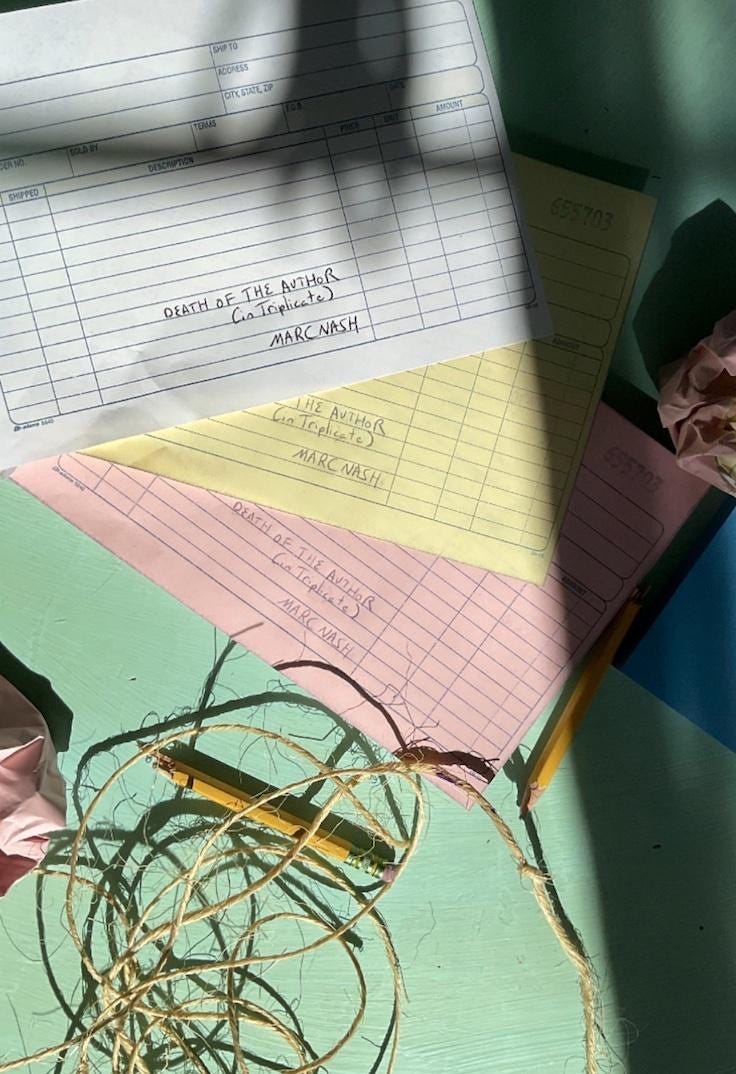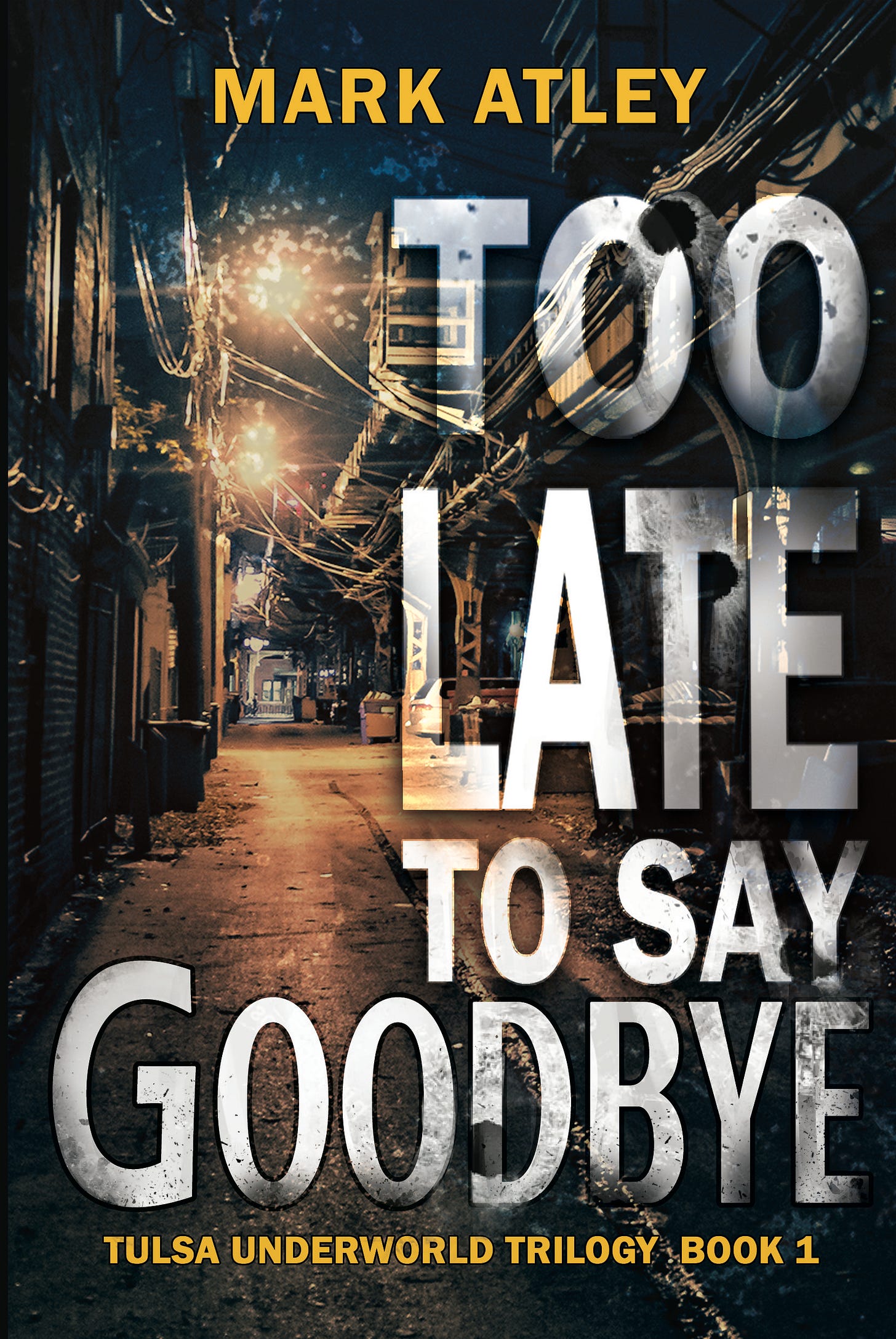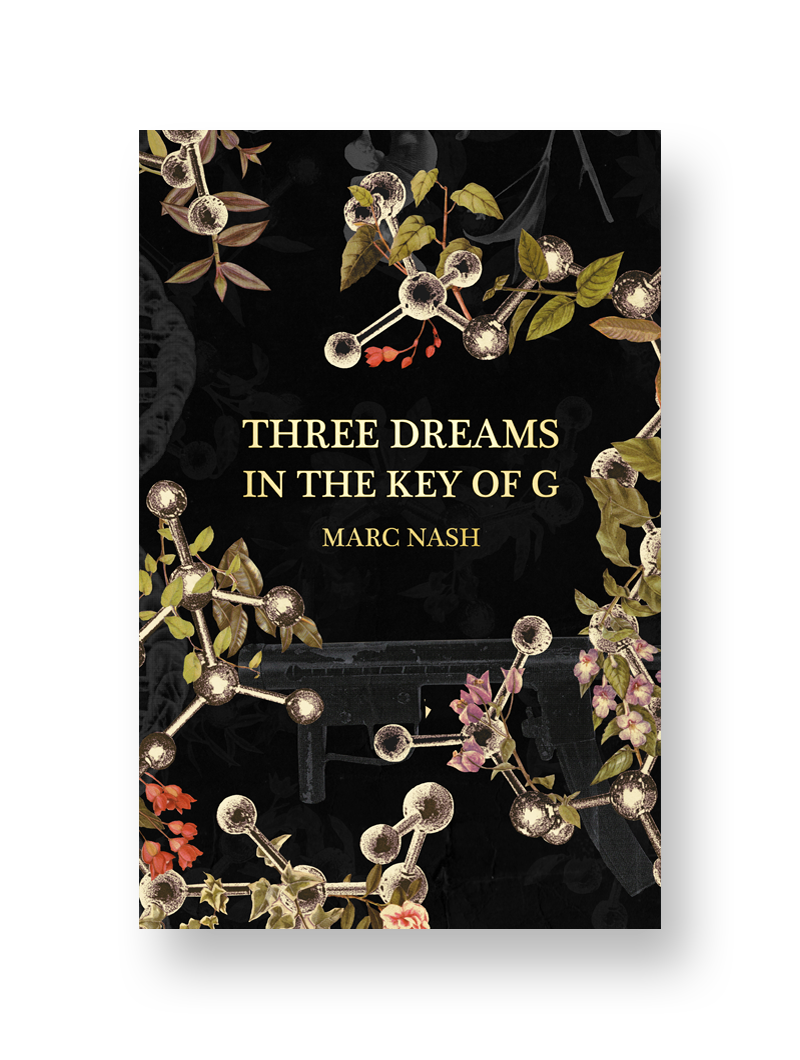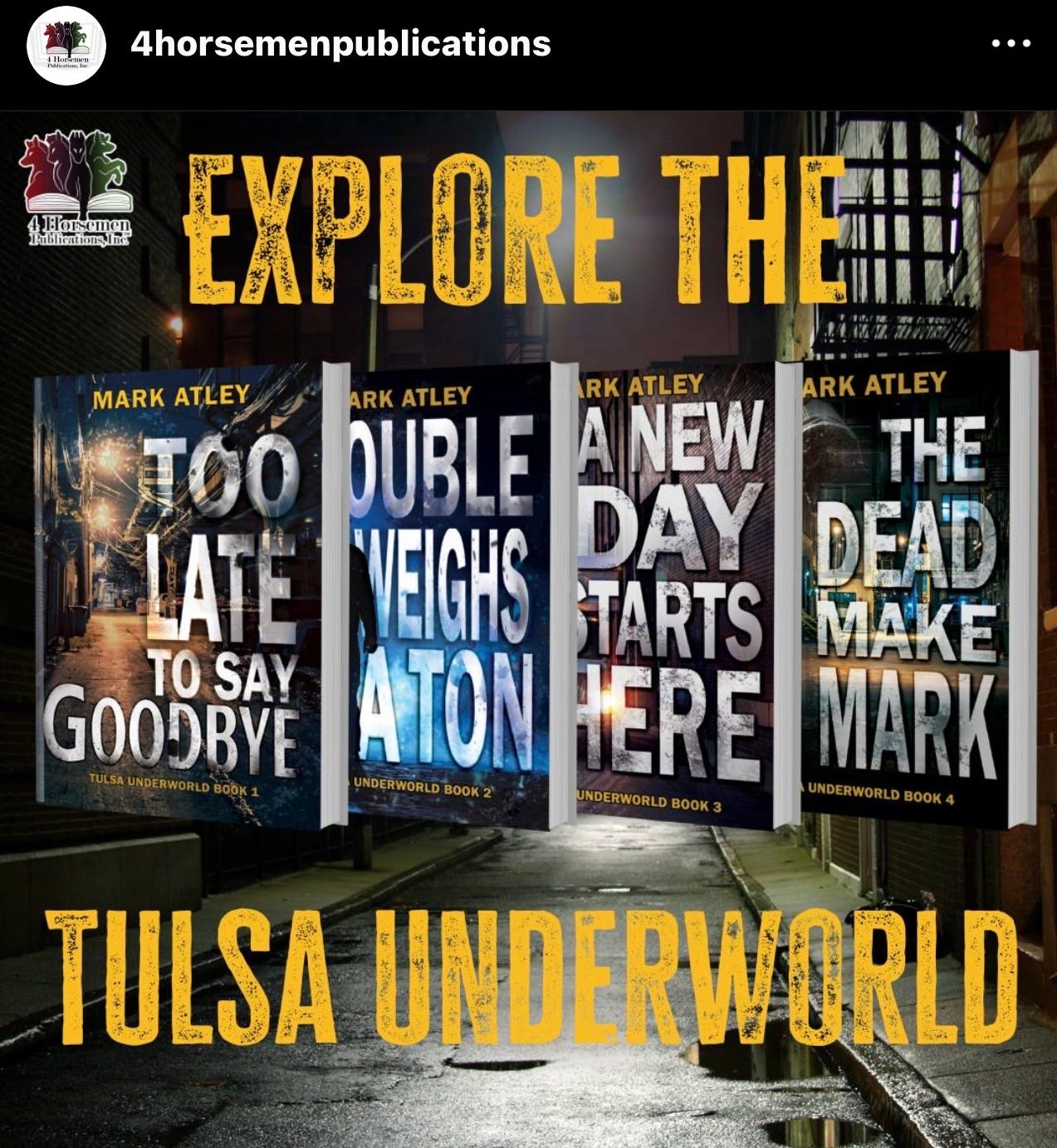#25 Marc Nash 1 on 1 with Mark Atley
Marc’s most recent work "Death Of The Author (In Triplicate)" has a philosophical detective at the heart of it, but also probes the power behind the throne of a writer who is writing about a writer (hence the "in triplicate"). It's published by Corona/Samizdat in pocket-sized paperback.
Hello everyone, and welcome back to "1 on 1 with Me!"
Life is hectic and I had to take some time off. Honestly, I knew I needed to slow down the publication of interviews to not overload you all and well…I really slowed it down….so after a few months break, we are back for more Author Interviews.
What are these Author Interviews I speak of, well, let me tell you. The world can be a pretty bleak place and I believe the best place to start at changing things (beyond yourself) is by investing in your community, and that is where these interviews come from. It’s my mission to create a compassionate and empathetic world where everyone matters. To strive to maintain positivity and gratitude in all we do, defaulting to compassion and always considering motivations. To fight for resolution, resist fear, and embrace love, practicing hospitality and recognizing that expectation is not communication.
So, for those returning, in this series, I highlight a new author and engage in a thoughtful conversation about who they are, what they care about, and their perspectives on various topics. I start with standard questions and then move into tailored follow-ups based on their responses. I like it because I find the format to be conversational, and I truly enjoy it. My primary focus is to highlight the author I am interviewing.
If you are interested in being a guest, please reach out to me on social media or email me with the subject line: "Author Interview." This initiative is my way of giving back to the writing community. The guests you’ll hear from in these interviews come from diverse backgrounds, and they may or may not be familiar voices in the writing community. That’s the beauty of this platform on Substack—it's free!
HELP ME HELP THESE AWESOME PEOPLE!
Share these interviews on social media. That’s the best way for others to find this series and enjoy the words of wisdom these people will bring to your life.
Subscribe to my Substack or follow me on social media such as BlueSky, Threads, X (Twitter), and Instagram.
Share links. Share posts. Share thoughts.
Remember to always choose positivity over negativity.
Check out my books and those featured here and drop a review. Like RedBull, reviews give authors wings.
On to the interview!
Marc Nash
Who are you and can you tell me a little about your work? What drives you? What do you hope to accomplish?
I'm Marc Nash, 61 and been writing since Uni. I started out writing stage plays, but when my twin boys were born and I could no longer hang out at theatre bars, I switched to prose writing and never gone back. I've always had the urge to write, starting off like many I suspect, writing awful song lyrics and cod poetry. I think for me writing is a means of self-expression as I try and figure out aloud about life. I just want to accomplish ensuring that I write every book that I've got in me and maybe by then to have worked out the answers to some of the questions about what it means to be human.
How do you see your relationship with the reader?
I don't have a type of reader in mind when I write, but I acknowledge that those who read me are going to be interested in at least three things: 1) what a novel is and what it can do 2) Language 3) Ideas
How do you view your characters? What has changed over time, and what has stayed the same? How do you develop complex characters?
I never think in terms of character, but in terms of voice. Rather than stitch characters together like some Frankenstein's Monster mosaic of different people, or submit to some psychological matrix, I prefer voice because how a character expresses themselves both in speech but also interior thought, tells you about their value system, their level of education, their blind spots and prejudices and their aspirations. Voice does everything character does and without having to be quite do defined.
What is your version of success? Has it changed during your writing journey? How so? What’s different now versus when you started?
I came up with a game plan that if I had 2000 readers, I might be able to subsist off that and write full time. It has not come to fruition but I'm no longer troubled by that. I write quickly, so having a part-time job doesn't really hinder my output, while I long ago gave up notions of making a living from writing. But I do think it's vital that writers answer the question of what writing means to them, because that way they will be able to keep things in perspective and set realistic targets. I made a short video about it if writers are interested.
What type of reader are you? How do you view books you read, and how do they affect you and your writing?
I have a booktube channel where I talk about the books I've read. I'm guessing I make about 30 vids a year covering the 130 or so books read. I like books that do something fresh and am always after books that do something innovative with their form. I'm the sort of reader who gives 5 stars to books I know are imperfect, but which I appreciate what they were doing, or at least trying to do, or introduce me to a new idea or unusual perspective. I suppose it's inevitable that I read with the eye of a writer, but I don't let it get in the way of enjoying a book
How do you find readers? What works and hasn’t worked for you? What resonates with you when readers share thoughts about your work? And where do you see yourself in the writing community and publishing world?
I'm not terribly sophisticated as a marketer as the materials I come up with have to offer me a certain creativity in making them or I find it hard to get motivated. So I make discussion videos, or even ones with finger puppets. I use Canva for making quote cards. While these marketing materials might be sound, the platforms for them are limited as selling spaces. The best thing about being an author for me, is doing live readings. You get an instant response in the room and you learn so much about your own work, much like stand-up comedians do when they're bedding in new routines. I once realised a pun wasn't working live, since the audience didn't know which of the two homonyms I was sounding, so it inspired me to make a kinetic typography video of the story instead. As to the writing community, I'm always happy to share my take on the process, but I always warn people I have an idiosyncratic approach that won't work for everybody. I have no idea how the publishing world see me!
—Please provide a brief blurb about yourself, and feel free to promote your recent book or work.
I've published 5 flash fiction collections and 7 novels. 4 of the novels and 4 of the flash collections were self-published through Kindle. My 2018 novel "Three Dreams In The Key Of G" was short listed for the Not The Booker Prize and consequently reviewed in The Guardian who called it "curiously impressive" which I now use in my Twitter profile. I don't really like the concept of genre, but I suppose my work would be called experimental literary fiction. Of the many authors I love, from Kafka, Sebald, Perec, Markson, Lispector, Kang and Olga Ravn, I don't really write like any of them. My most recent work "Death Of The Author (In Triplicate)" has a philosophical detective at the heart of it, but also probes the power behind the throne of a writer who is writing about a writer (hence the "in triplicate"). It's published by Corona/Samizdat in pocket-sized paperback.
—Tell me something interesting about yourself that these questions stimulated thought about. And tell me something you want others to know.
I have always described writing like being in a kiddy sandpit, only instead of sand we're playing with words and tipping them over ourselves and erecting edifices in words. For me it's only ever enjoyable, even the dry and technical redrafting that comes after the first draft which is all play, because I'm one of those redrafters that is always adding lines rather than striking them out. The words lead me to the next lot of words, so that makes me a 'pantser'. I never plan in advance, nor have mood boards or character arcs plotted on graph paper, something I have great fun with in the last part of "Death Of The Author (In Triplicate)", where an author is tidying away all his prompts, notes and plans and even his accompanying playlist for writing, as he readies himself to submit the completed manuscript to his agent.
How did you stumble your way into making videos and what type of effect do you believe it has or not have on your work? What types of novels or books are you promoting and how do you decide what would make a good video?
Goodness that's a good question, it';s been so long since I started making them, I can't rightly remember. I think in regard to video promo vids, it was simply that as I have to find making marketing materials creative in and of themselves in order to motivating me, picking up a video seemed the best fit for me (I can't draw for example). In regard to my book reviewing channel, that started by accident. I just made a few talking about books and literary themes and putting them out there because they were books I wanted to discuss with others that had read them. And then I discovered there was this thing already existing called Booktube, so I formalised it into making regular videos discussing ALL the books I was reading and establish it as a channel. I had never gone into it thinking that. In terms of what makes a good video, I keep it simple. 6-10 books reviewed roughly fortnightly, the odd discussion video about a literary theme or related stuff. I used to do book tags like all other Booktubers but eventually the tags are the same and you find yourself repeating about favourite books etc. For each new work of mine I restrict myself to no more than two dedicated videos, as the channel is mainly for other writers' books in review, but being part of the Booktube community is probably my best source for selling and garnering other reviews for my work.
You mentioned realistic goals. What are some of yours and can you tell us how you remind yourself to keep your horizon…realistic?
I no longer have any goals in terms of sales numbers or anything like that. I stick to the goals of any project itself: each book sets a set of literary, linguistic and artistic challenges and the goal is simply to meet as many of these as I can through the creation of the book. As to being realistic, as said, writing is never going to be my main source of income and I'm fully reconciled to that. As soon as I've got a new book out into the market, I move on to thinking about the writing of the next one.
There are all sorts of tools for marketing and you mentioned several: what do you find most frustrating about products like Canva and what are some of the best features of those products?
Canva used to be accessible, easy to navigate and have the tools you needed. It no longer seems to be any of that, I suspect because they made it more monetisable for themselves where I'm still on a free version, but they lost half my work, there is no longer a dedicated Tweet template (it's all Insta & TikTok) and the format templates seem to have had a wholesale change and not for the better. Maybe things like this are my fault, I only ever make use of free software. I write a short story as a flow chart on free software, couldn't download it without paying, so took a screengrab. Then had to pay my son to somehow put it into Word for me, which he did but moaned at the agreed fee where he'd seriously underestimated the amount of work involved.
How does your normal life bleed into your fiction and what sort of effect does your fiction have on your family?
Oh my family have no interest and leave me to get on with it. My mother will read each book and express a modicum of surprise at where the ideas come from. As to normal life, I don't really make a distinction from the writer's life as I see myself a writer 24-7. The amout of nights kept awake in bed by writing ideas, sometimes composing whole scenes there on my pillow. I'm always open to anything I see or encounter to become material, waiting for buses has provided me with at least two short story ideas. And since my writing is just me doing battle with life and existence on the page, the mere act of living and existing on a daily basis and reflecting on parts of that are very much part of my writing life. My personal view is that most of what we take for granted as reality, is itself a fiction, or at least a conveniently agreed upon consensus and my fiction is tailored to getting underneath what that consensus has established and questioning it.
Cheers Mark, great questions! As you can see, I give good talking head!
Twitter https://x.com/21stCscribe
Blue Sky @marcnashauthor.bsky.social
"Three Dreams In The Key Of G" short-listed for the 2018 Not The Booker Prize Available from Amazon, Blackwells, bookshopdot.org
Mark Atley is an author known for writing crime fiction. His works include "Too Late to Say Goodbye," "Trouble Weighs a Ton," and "The Olympian." Atley has been recognized for his storytelling through complex characters, engaging dialogue, and narratives centered around crime themes. He is also a member of the International Thriller Writers (ITW).
Mark Atley fiction is often characterized by complex characters, engaging dialogue, and narratives that build tension towards explosive climaxes. Atley's approach to writing often involves creating intricate plots where characters' histories and motives are deeply interwoven, providing readers with both entertainment and a commentary on crime and morality. Mark Atley also engages with his audience through social media, where he can be followed for updates on new releases and insights into his writing process.
If you are interested in being a guest, please reach out to Mark on social media or email with the subject line: Author Interview.





